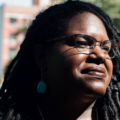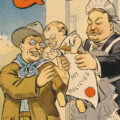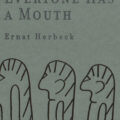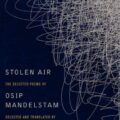Torn in the sky: on Ilya Kaminsky and Shane McCrae

In Deaf Republic, Ilya Kaminsky connects our current era to a place and time that feels Soviet, although familiar. The book is a narrative with dramatis personae—townspeople, an unborn child, and puppets—that explains at its open, “Our country is the stage.” Kaminsky, a self-identified Fabulist (from an interview with The Massachusetts Review, 2018), drops us into conflict—a group of citizens ordered to disperse, a deaf child who spits at the soldiers, and the shot the soldiers fire back that drops the world into a deep silence: “The sound we do not hear lifts the gulls off the water.”
The silence captured in lines that are pure music, like a black hole, draws the rest of the lines and the narrative towards it. The crowd absorbs the soundless scene before it—the boy’s mother with his body in the street:
Fourteen of us watch:
Sonya kisses his forehead—her shout a hole
Torn in the sky, it shimmers the park benches, porchlights.
In Kaminsky’s lines, sound takes visible shape. The ordinary things of the world transmogrify, and a small detail, stripped down, takes on the weight of a country:
We see in Sonya’s open mouth
The nakedness
Of a whole nation.
There’s innocence in the nakedness exposed, which is both the vulnerability of children and the nakedness of the fallen world.
Of the many motifs and leitmotifs that arise throughout the collection—puppets, fingers, birds, bombs, snow—perhaps the most striking is the image of the soundless mouth. The mouth, which utters nothing, gives voice to victims and also identifies their murderers and accomplices:
Ours is a country in which a boy shot by police lies on the pavement for hours.
We see in his open mouth
The nakedness
Of the whole nation.
Kaminsky recalls Larkin’s poem “Days” in his “What Are Days.” In Larkin’s poem, days are “where we live” and the solution to the problem of what days are is the alternative: the answer “brings the priest and the doctor” running “in their long coats.” For Kaminsky, the days of May “walk to prisons” first like middle-aged men, then like young men, “overcoats / thrown over their pajamas.”
Later, Mama Galya experiences the days of June walking the same way, and she praises baby Anushka in her pajamas (no overcoat). Galya explains, “I am not deaf/I simply told the world//to shut off its crazy music for awhile.”
As in his first book, Dancing in Odessa, Kaminsky draws amply from personal history and memory, but he drives these into the contemporary historical moment, shaping a narrative that straddles past and present. His political acuity stretches from the Soviet experience to the recent history of his birthplace, Ukraine, and to America today. These are revealed to be the mutually inextricable threads of a single knot—the story of occupation, resistance, and complacency.
In Shane McCrae’s latest book, The Gilded Auction Block, silence is displaced by the noise, bluster, and fanfare of the ascending 45th president. America is the poet’s addressee, with President Trump looming like a demigod bringing the apocalypse:
America he trumpets the end of your
Suffering both swan and horseman trumpeting
From the back of the beast the fire and rose are one
On the president’s bright head the flames implanted
To make a gilded crown America
McCrae’s thin cover of gold as ornamentation over both crown and auction block also echoes the more archaic meaning: “to make bloody.” McCrae employs a lack of punctuation and unique spacing and over the course of the book, America, which began as subject, addressee, becomes predicate. “America still my heart belongs to,” he writes in the poem “Purchase,” where the nation becomes the greater collective part of the self. In the poem, two men (possibly coworkers) come face to face with the original sin of America:
The white man who as I was walking to
Wearing a hoodie to a meeting in
A building which was at the time a crew was
Repairing he stepped up to me and asked
So are you guys just drying out the floor here
How but with my life can I answer him
Who calls me down from the gilded auction block
What is captured in the poem are the realities McCrae lives with: “America I was born incapable/Of owning what I work for even but/It doesn’t it never mattered doesn’t mat-/Ter where I went to school or where I teach.” The fragmenting of phrase and lines (even to the point of breaking the pivotal word matter) captures a breakdown of self or self-perception, as the poem moves from one internalized reality to another, starkly different context.
Exploring the inescapable legacy of slavery, in “We’ll go no more a roving,” McCrae borrows Lord Byron’s tight quatrains for a poem that, like the original (“So We’ll Go No More a Roving”) relinquishes hope. But he intensifies the irrevocability in locked rhyming couplets:
We’ll go no more a roving now
Except as the mule roves with the plow
The white stars make the endless black
A night the master calls us back.
“The Hell Poem” is a longer lyric that moves—in counterpoint to Kaminsky’s more dramatic presentation—into solitary psychoanalytic dreamscapes. Where it lacks the clearer expressions of anger, loss, and insult of Kaminsky, it brings forth nightmare, despair, and disorientation instead. It’s more akin to the language and landscape of Ted Hughes than to the Seamus Heaney epigraph it moves from (from “A Dog Was Crying Tonight in Wicklow Also,” which draws inspiration from an Igbo story).
In lines full of archetypal images, the punctuated music is further fragmented by vast stretches of white space:
I let the oars slip
Into the lake
except they didn’t
sink they just stood there then heads
And necks and faces
sprouted from the handles then
arms and legs sprouted
From the sides and the oars walked away Describe
the oars
the oars walked on water
Like oars
their faces steamed in the sun
Kaminsky and McCrae’s poems offer their reader a panoramic view of current and past events, parables for our moment. Kaminsky shows the world moving around a still, silent object, past the dead boy of his opening poems, the silent mouth in its paradoxical articulation, while McCrae, in poems like “The Skinny Repeal Is Voted Down,” identifies the paradoxes of America, e pluribus unum, in the gulf that exists between himself and strangers gathered in fast food restaurants of everyday America:
Four strangers at a Wendy’s at a
Table across the room I hear them
Talking about their children’s children
That one is doing better now in
School and what made the difference and
Whether one really should have gotten
A car for Christmas as around us
Clear windows are obscured by clear rain
I breathe the words they say to each other
We live and die apart together
Ilya Kaminsky and Shane McCrae each access the intersection between public citizen and private perception, activity and receptivity, employing their poetic talents to reflect and refuse, to apologize and to grieve. These books, however, are not political rallying cries.
Deaf Republic and From the Gilded Auction Block both work to recount, interpret, and expose—in ways that feel similar to the work of the World War I poets of Great Britain, who grappled with corruption and class, violence and technological change, inept political leaders treading the backs of the masses they pretend to represent. Signifying much, but unable to alter events, or mobilize social action. Poetry makes nothing happen, its blessing and curse.
About Valerie Duff
Valerie Duff-Strautmann’s poems have appeared in Ploughshares, Poetry Daily, The Common, and elsewhere; recent book reviews have appeared in the Boston Globe, PN Review, and Harvard Review. Her book, To the New World (Salmon Poetry), was shortlisted for the 2011 Seamus Heaney Centre Prize for Poetry. A recipient of grants and fellowships from the Massachusetts Cultural Council, St. Botolph Foundation, and VCCA, she is the poetry editor of Salamander Magazine and works as a freelance writer.





